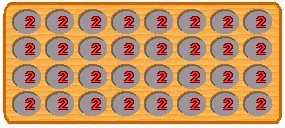Moruba → German.
| Moruba |
| Other Names: Maruba, Ncuva, Tshimaya, Ntijwa, Tsoro |
| First Description: P. A. Wagner, 1917 |
| Cycles: Two |
| Ranks: Four |
| Sowing: Multiple laps |
| Region: South Africa |
Moruba (also Maruba) is a mancala game played by the Pedi (obsolete: Bapedi) in the South African provinces of Limpopo (mostly in the North Sotho speaking parts) and Mpumalunga in former Transvaal. Later, the game has been spread by mine workers to Gauteng. It is closely related to games described in Mozambique, e.g. Tchouba and Njombwa. The game was first researched in 1917 by the British ethnograph P. A. Wagner.
Moruba is traditionally played by men in the late afternoon in the shade of a tree. The game was used during war and was a social activity where men strategised about a variety of activities and events related to them, also shared advise and ideas. Language, expressions and terminology of the game signify what happens when war takes place. As women weren't allowed to go to war, they didn't play the game. In recent days, however, both genders began to play.
The South African Sports Commission has recently published a book on indigenous games including Moruba, which, however, fails to give the true rules of the game.
Starting in 2003, Moruba is promoted as an indigenous sport by the CSIR's National Product Development Centre and the South African Sports Commission (SASC). There were team and individual tournaments at the Indigenous Games Festival in Polokwane and the Indigenous Games Competition in Tzaneen. The game is also supported by the Mpumalanga Department of Sports, Recreation, Arts and Culture and the Department of Sport, Recreation, Arts and Culture of the Province Gauteng, because it forms an important expression of indigenous identity and, as it was said, of a "healthy life style". The best players, among them D. Shikwambam and Petrus Shibambu, are organized in Mindsports South Africa (MMSA). Besides Moruba, other games gain popularity, e. g. Morabaraba, Diketo, Injuba, Izingeda and Ingcathu. This renaissance of African games is a response to Thabo Mbeki's call "to rediscover what was lost by indigenous people (of Africa through colonialism)". Mbeki is the president of "Boxing South Africa" and delivered the famous speech "I am an African" in the South African Parliament which promoted a return to African values.
Today the towns of Sasekani and Bolobedu are centers of the game. Strong clubs are also in Ka-Phalaborwa, Letaba, and Selwane. The newspaper Mopani News reports regularly on Moruba competitions. The game which is already taught in the Bolobedu High School, will soon be introduced in all schools of Limpopo Province. Dickson Mpofu, the indigenous games co-ordinator in Mpumalanga, even wants to register Moruba with the Olympic committee.
The rules given below are those officially used in competitions.
Quote
"At least with Moruba you can get away from your problems for a while. It’s better than sitting in a tavern all day."
Unemployed Moruba Players at Masupa Circle, Soweto (2012)
Rules
The size of the game board often depends on the number of players. Most common are boards which have four rows of 12 holes (mekoti) each, but the number of holes can vary from four to 36 holes per row. The holes are dug into the earth. Each hole has two counters, usually pebbles or morula pips, which are called mathlapa ("cattle") or tinkhomo ("cow").
Initial Position
The game is played by two persons and sometimes by teams of up to six.
Each player (or team) only uses his side of the board.
On his turn a player takes the contents of one of his holes, which must contain at least two stones, and distributes them, one by one, counterclockwise into consecutive holes on his own side.
If the last stone falls into a non-empty hole, its contents are distributed in another lap in the same direction.
The move ends (kulala; literally "to sleep") when the last stone is dropped into an empty hole.
If the last stone falls into an empty hole of the inner row and the opposite hole of his opponent contains stones, these enemy stones are "killed" (tlaba) or "hit". Additionally, the stones in the hole of the same file in the outer row are "captured" (tlola). The killed or captured stones are removed from the board. The player is then entitled to capture the contents of any two other enemy holes.
When a player has only singletons, he is permitted to move them, but only in empty holes.
The player who has still stones at the end of the game is declared the winner. It is a draw, when the board position repeats without anything being captured.
See also
- Moruba players. Indigenous Games Festival 2007, South Africa.
- Moruba championship game. Indigenous Games Festival 2007, South Africa.
References
- Anonymous.
- Local Team Brings Home Traditional Games Trophies. In: Herald 2004; 18 (46), 6.
- Anonymous.
- Moruba Keeps Kasi Men Entertained. In: Daily Sun March 14, 2012.
- Santos Silva, E. R.
- Jogos de Quadrícula do Tipo Mancala com Especial Incidência Nos Practicados em Angola. Instituto de Investigação Cientifíca Tropical, Lisboa (Portugal) 1995.
- Thokozile Mkonto, K.
- Indigenous Games Rule Book. Sport Recreation South Africa, Pretoria (South Africa) 2006: 22-23.
- Wagner, P. A.
- A Contribution to Our Knowledge of the National Game of Skill of Africa. In: Transactions of the Royal Society of South Africa 1917; 6 (1): 47-68.
Copyright
© Wikimanqala.
By: Ralf Gering.
Under the CC by-sa 2.5.
